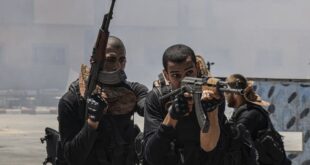 RAMALLAH — Four Palestinians were killed Saturday in two separate early morning Israeli air strikes in the southern Gaza Strip town of Rafah.
RAMALLAH — Four Palestinians were killed Saturday in two separate early morning Israeli air strikes in the southern Gaza Strip town of Rafah.
The first air strike killed a 16-year-old girl, Kifah Natour, and her brother, Amar, 15. Their mother, Huda, 50, and four other people, including their 13-year-old brother, were seriously wounded when the missile struck.
The Israeli army said it had targeted groups of armed Palestinian activists.
A second air strike killed two other people that the Israeli army said were members of Islamic Jihad and Hamas.
The deaths bring to over a dozen the number of Palestinians killed in the past three days since Israel started a ground operation in Rafah, on the border with Egypt. The operation has seen Israeli tanks, bulldozers and troops move into the town. Early Saturday, Israeli tanks took over an abandoned Palestinian security installation. Friday, Israeli troops conducted door-to-door searches.
Israeli military activity in the Gaza Strip has escalated since the June 25 capture of an Israeli soldier by the military wing of Hamas and two other organisations. An already beleaguered strip has since then been almost completely sealed off from the rest of the world, and international humanitarian organisations are warning of a full-scale humanitarian crisis in the strip, where poverty affects nearly three-quarters of the population.
The conflict in Lebanon has only served to take away the spotlight from Gaza, prompting the UN on Thursday to caution that, “with international attention focusing on Lebanon, the tragedy in Gaza is being forgottenâ€.
According to UN figures, since June 28, 175 Palestinians have been killed in Gaza, including approximately 40 children and eight women, and over 620 people have been injured in the Gaza Strip. One Israeli soldier has been killed and 25 Israelis have been injured, including 11 Israelis injured by homemade rockets fired from the Gaza Strip. Palestinians have fired 319 homemade rockets towards Israel in those weeks while the Israeli army has fired an average 200-250 artillery shells per day into the Gaza Strip and conducted at least 220 aerial bombings.
The strip suffers from a shortage of fuel, food and medicine, and doctors have been warning for weeks that they are working at over full capacity.
Electricity supply is scarce after Israel bombed the strip’s only power distribution plant, and Gaza Strip residents receive only six to eight hours electricity a day, making refrigeration next to impossible and increasing the incidence of gastrointestinal ailments. Hospitals and sewage plants rely on generators to run 24 hours.
Israel yesterday said it had opened a border checkpoint to allow 160 truckloads of food and medical supplies into Gaza, as well as gasoline and diesel. Also Saturday, the Gaza-Egypt border crossing was expected to open for one-way traffic into Egypt after Palestinian and Israeli officials and European monitors reached an agreement Friday, said Palestinian negotiator Saeb Erekat. It would be open Saturday and Sunday.
It would be the second time since the latest fighting erupted in Gaza June 25 that the terminal would be opened, but the previous time was for Palestinians returning home from Egypt. Earlier agreements to reopen the crossing from Gaza to Egypt broke down at the last minute.
 Eurasia Press & News
Eurasia Press & News
